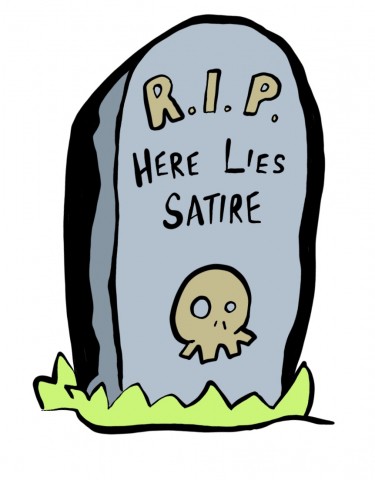From the early examples of English-language satire in works like Jonathan Swift’s A Modest Proposal, an essay about a possible solution for the Irish Famine, to more contemporary examples such as satire websites like The Onion or Reductress, the goal of this comedic communication is to provide comment on the socio-political situations that surround us.

In the past 10 years, the satire industry has become bloated and underpaid. This is a result of three specific factors. First, more mainstream individuals are creating and distributing satire, and reaching a much larger audience, too. Second, social media has made satire overwhelmingly available. And third, most people view satire as lacking in results.
In the contemporary context, there are many individuals doing work that would be considered satirical. Comedians like Trevor Noah or Samantha Bee mock the current North American socio-political climate in their acts and TV shows.
The quality of today’s satire is probably the highest it has ever been, but the greater quantity of satirical articles available to the general public creates a smaller audience for young satirists to thrive in. The industry is, undoubtedly, starting to bloat.
In the satire writing that appears online on websites like The Beaverton, the amount of capital that the website — nevermind the writer — is generating has declined due to the increasing influence that social media has and the oversaturation of the industry, an effect that is created by so many people writing and publishing satire online.
It is easier to create a piece of satire now than it would have been in Swift’s lifetime. Anyone can become a satirist — you probably know someone on your Facebook or Twitter feed who considers themselves a superb satirist — and that creates a problem for the people who actually try to make a living from their satire.
Most importantly, in the modern context, satire does very little to help the progress of social or political movements. While today’s low levels of activism do not fall exclusively on the backs of satirists, the lack of action that results from satire reflects the actual importance or weight of the pieces themselves.
One example of a satirist who finds a way to tangibly support a social cause is John Oliver — who often contributes to a charity or an activist organization during the presentation of his satire.
Satire is an important mechanism to call out the problems and injustices that occur in our society. Without it, many of the issues that we face would not be corrected. However, it is important to remember that there are actual people behind satire and that they deserve to be paid equitably.
Just because you share an article on your social media platform of choice doesn’t mean you have effected change — activism means going one step further to find a way you can contribute to the cause.
—
Jordan Stovra
Graphic: Lesia Karalash / Graphics Editor
Leave a Reply